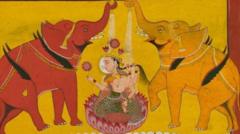The recent escalation follows a significant terrorist attack, shaking the already brittle peace between India and Pakistan, particularly in the contentious Kashmir region.
### Resurgence of Conflict: India-Pakistan Relations on Edge Again

### Resurgence of Conflict: India-Pakistan Relations on Edge Again
As hostilities flare over Kashmir, the potential for an outbreak of war looms large between the two nations.
India and Pakistan find themselves at a critical juncture as tensions rise in Kashmir after a deadly attack that hammers home the fragility of their peace. The reemergence of hostile rhetoric and military posturing signals a dire need for re-evaluation of regional stability.
Amidst rising tensions between India and Pakistan, both nations have ramped up aggressive exchanges following a deadly terrorist incident in Kashmir on April 22, which left 26 victims dead. The Indian government has accused Pakistan of involvement, a claim that Pakistan vehemently denies, intensifying the atmosphere of mistrust.
Kashmir, a picturesque region in the Himalayas, has been a focal point of conflict for nearly eight decades, with both countries claiming it as their own. This ongoing conflict has often turned violent, leaving local populations caught in the crossfire. The longstanding feud has rendered the voices of Kashmiris largely unheard in matters concerning their own land, making the situation even more complicated and charged.
The roots of this conflict date back to the partition of British India in 1947. As Britain withdrew, it bifurcated into India and Pakistan, leaving the status of Kashmir in limbo. Both nations swiftly laid claim to the region, with military confrontations erupting as a result. The Hindu ruler of Kashmir, initially reluctant to accede to either country, eventually sought Indian support against advancing Pakistani forces, solidifying Kashmir’s contentious status.
The ongoing political instability remains a potent reminder of the complex history between these nuclear-armed nations, with the specter of military conflict looming ominously as diplomatic efforts to secure lasting peace continue to falter.
Amidst rising tensions between India and Pakistan, both nations have ramped up aggressive exchanges following a deadly terrorist incident in Kashmir on April 22, which left 26 victims dead. The Indian government has accused Pakistan of involvement, a claim that Pakistan vehemently denies, intensifying the atmosphere of mistrust.
Kashmir, a picturesque region in the Himalayas, has been a focal point of conflict for nearly eight decades, with both countries claiming it as their own. This ongoing conflict has often turned violent, leaving local populations caught in the crossfire. The longstanding feud has rendered the voices of Kashmiris largely unheard in matters concerning their own land, making the situation even more complicated and charged.
The roots of this conflict date back to the partition of British India in 1947. As Britain withdrew, it bifurcated into India and Pakistan, leaving the status of Kashmir in limbo. Both nations swiftly laid claim to the region, with military confrontations erupting as a result. The Hindu ruler of Kashmir, initially reluctant to accede to either country, eventually sought Indian support against advancing Pakistani forces, solidifying Kashmir’s contentious status.
The ongoing political instability remains a potent reminder of the complex history between these nuclear-armed nations, with the specter of military conflict looming ominously as diplomatic efforts to secure lasting peace continue to falter.























